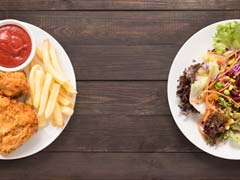Food addiction, though not officially recognised as a clinical diagnosis, can have serious implications for an individual's health and quality of life.

Frequently hiding or feeling shame about food consumption can be a sign of food addiction
Food addiction is a behavioural addiction characterised by an intense, compulsive craving for and consumption of certain foods, often high in sugar, salt, and fat. Similar to other types of addiction, like drug or alcohol addiction, people with a food addiction may feel an inability to control their food intake, despite negative consequences to their physical, mental, or emotional well-being.
Food addiction can lead to weight gain, obesity, nutritional deficiencies, and various physical and psychological health issues. However, it is important to note that not everyone who struggles with food cravings or emotional eating necessarily has a food addiction. People may have varying relationships with food, and what is considered "normal" can differ from person to person. Read on as we share signs of food addiction and tips to overcome.
10 Signs of food addiction:
1. Frequent and intense cravings for specific types of food.
2. Difficulty stopping or controlling the amount of food consumed.
3. Frequently hiding or feeling shame about food consumption.
4. Using food as a coping mechanism for emotional distress.
5. Experiencing irritability, anxiety, or restlessness when attempting to cut back or stop consuming certain foods.
6. Avoiding social events or activities that do not involve food.
7. Continuing to consume large quantities of food despite negative physical or emotional effects.
8. Repeated unsuccessful efforts to reduce or control the amount of food consumed.
9. Constantly thinking about food, planning meals, or obsessing over the next opportunity to eat.
10. Needing to consume increasing amounts of food to achieve the same level of satisfaction.
How to identify and overcome food addiction:
1. Recognise the problem
Acknowledge that you may have an unhealthy relationship with food that requires attention.
2. Seek professional help
Consult a healthcare professional, such as a doctor or therapist, who specialises in addiction or disordered eating.
3. Keep a food diary
Track your eating habits and emotions to identify patterns and triggers.
4. Build a support network
Surround yourself with understanding and supportive individuals, such as friends, family, or support groups.
5. Develop coping strategies
Find alternative ways to deal with stress or emotional distress, such as practicing mindfulness, physical activity, or engaging in hobbies.
6. Create a meal plan
Establish a structured and balanced eating plan with regular mealtimes to reduce impulsive and disordered eating.
7. Practice mindful eating
Pay attention to physical hunger and fullness cues. Slow down while eating and savour each bite to enhance satisfaction.
8. Manage triggers
Identify situations, people, or environments that trigger your food addiction and find healthier ways to manage or avoid them.
9. Set realistic goals
Start with small, achievable goals to gradually reduce or modify your food intake.
10. Stay consistent and patient
Recovery from food addiction takes time and effort. Be patient with yourself and stay committed to your recovery journey.
If you think you or someone you know may be struggling with a potential food addiction, it is advisable to consult a healthcare professional or registered dietitian who specialises in disordered eating or addiction.
Disclaimer: This content including advice provides generic information only. It is in no way a substitute for a qualified medical opinion. Always consult a specialist or your own doctor for more information. NDTV does not claim responsibility for this information.
DoctorNDTV is the one stop site for all your health needs providing the most credible health information, health news and tips with expert advice on healthy living, diet plans, informative videos etc. You can get the most relevant and accurate info you need about health problems like diabetes, cancer, pregnancy, HIV and AIDS, weight loss and many other lifestyle diseases. We have a panel of over 350 experts who help us develop content by giving their valuable inputs and bringing to us the latest in the world of healthcare.














